How Spiritual Care Impacts Palliative Sedation Patients


Spiritual care is a vital but often overlooked component of holistic palliative treatment, especially in patients undergoing palliative sedation. This article explores how spiritual interventions influence patient outcomes, decision-making, and the overall quality of life at the end of life, emphasizing the importance of integrating spiritual support into medical practice.
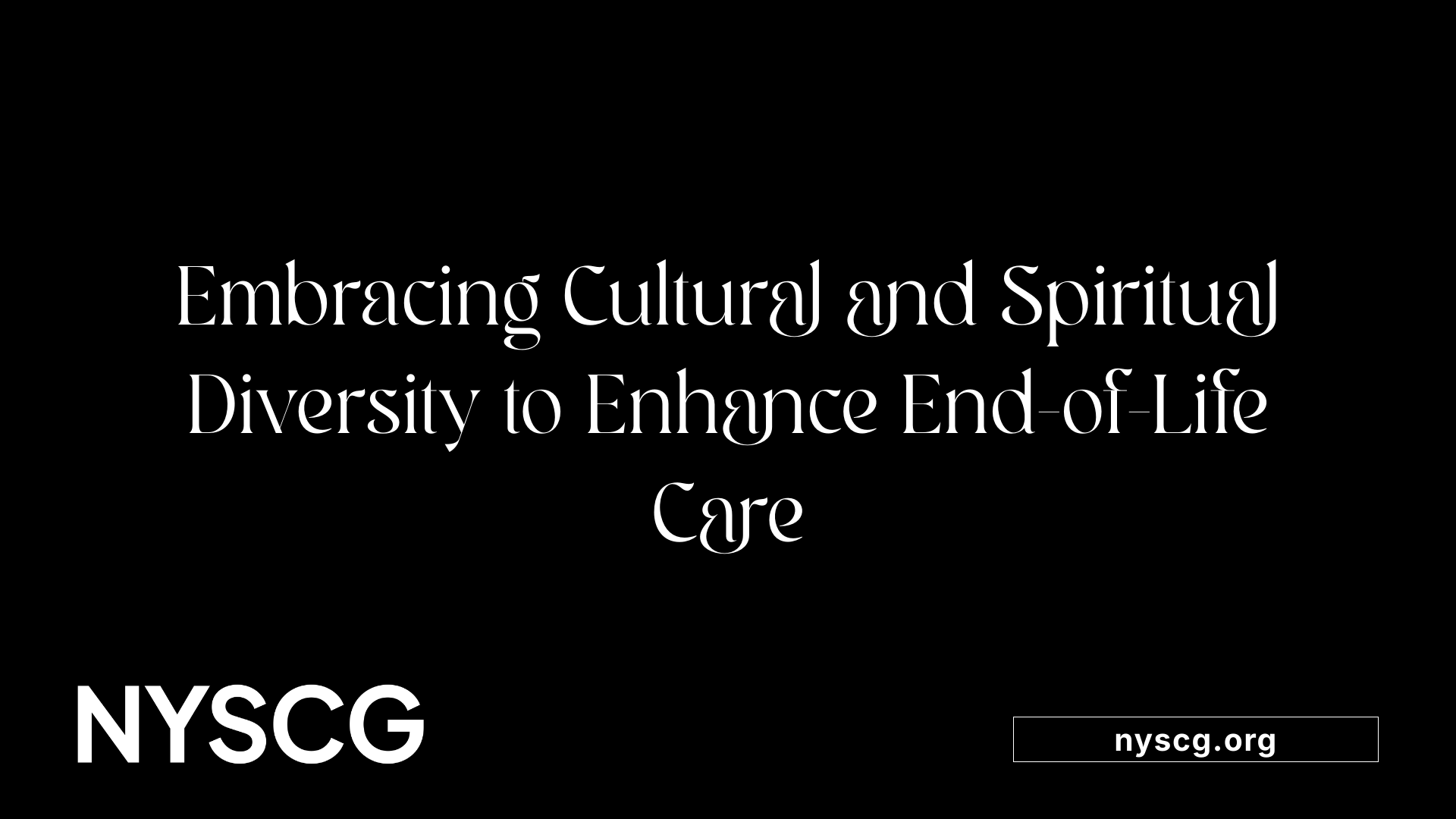
Cultural, spiritual, and religious differences play a crucial role in how patients and their families perceive death, dying, and what constitutes a 'good' death. These beliefs influence preferences for rituals, interventions, and the level of spiritual involvement in care.
Different cultures may see death as a transition to another stage of existence, a reunion with ancestors, or the final ending of life. Recognizing these views helps healthcare providers to plan care that aligns with the patient's worldview, respecting their values and wishes.
For instance, some cultures prioritize family-centered decision-making, while others emphasize individual autonomy. Understanding these cultural nuances enhances communication, builds trust, and fosters respectful relationships.
Incorporating cultural competence into multidisciplinary teams—comprising physicians, nurses, spiritual caregivers, and psychosocial experts—ensures comprehensive support addressing physical, emotional, social, and spiritual needs.
Respectfully addressing diverse practices, such as specific rituals before or after death, can improve patient satisfaction and emotional comfort. It also prevents cultural misunderstandings that might hinder care efficacy.
When healthcare providers demonstrate awareness and respect for cultural differences, patients are more likely to feel understood and valued. This trust encourages open dialogue about fears, preferences, and expectations.
Effective communication tailored to cultural contexts allows discussions around sensitive topics like euthanasia, artificial nutrition, or organ donation to be handled with empathy and clarity.
In summary, acknowledging and integrating cultural and spiritual diversity into palliative care leads to more personalized, respectful, and holistic end-of-life experiences. It ensures that care is not only medically appropriate but also morally and culturally aligned with each patient's unique identity.
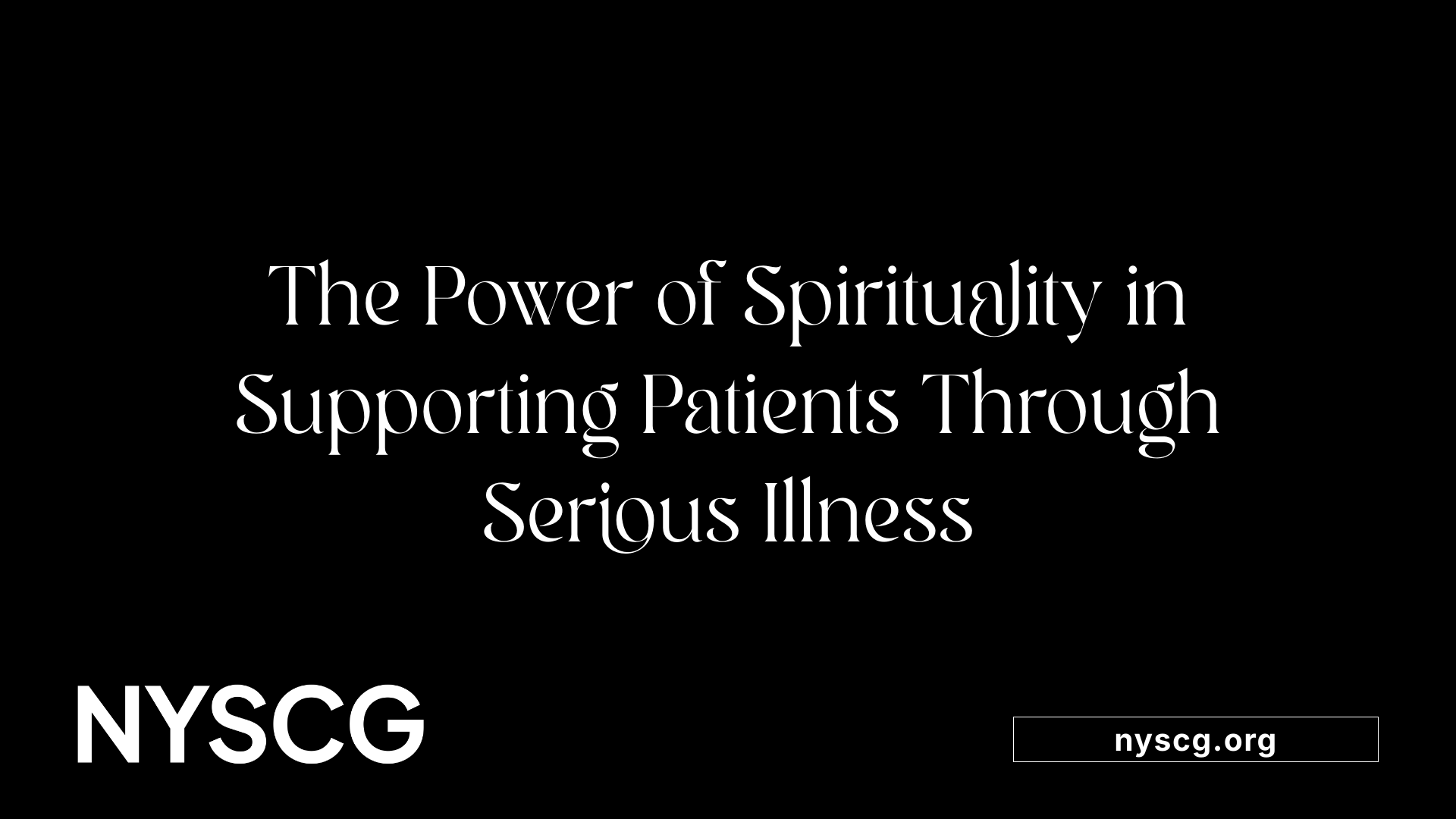
Spirituality plays an essential role in supporting patients during serious illness and approaching end of life. It offers comfort, hope, and a sense of meaning, which are vital for coping with suffering and uncertainty.
In palliative care, addressing spiritual needs helps alleviate spiritual distress—feelings of disconnection from beliefs, loved ones, or a higher power. Facilitating connections through prayer, rituals, or community support can bring a sense of peace and reconciliation. Healthcare providers can support this process by gently exploring patients’ spiritual concerns and offering appropriate resources, such as chaplains or faith-based groups, even if they are not specialized spiritual caregivers.
Spirituality deeply influences decision-making and health behaviors. Patients’ beliefs about life, death, and their afterlife often guide choices about treatments, acceptability of interventions, and preferences for the place of death. Incorporating spiritual assessments through tools like FICA or HOPE helps clinicians understand individual values and tailor their support accordingly.
Holistic care that integrates spiritual aspects leads to a greater sense of dignity, improved quality of life, and more meaningful end-of-life experiences. Recognizing and respecting each patient’s spiritual framework fosters trust, enhances psychological resilience, and empowers patients to make authentic decisions aligned with their beliefs.
Ultimately, addressing spirituality enriches patient care by connecting physical, emotional, psychological, and existential dimensions—creating a comprehensive approach that respects the full human experience during life's final stages.
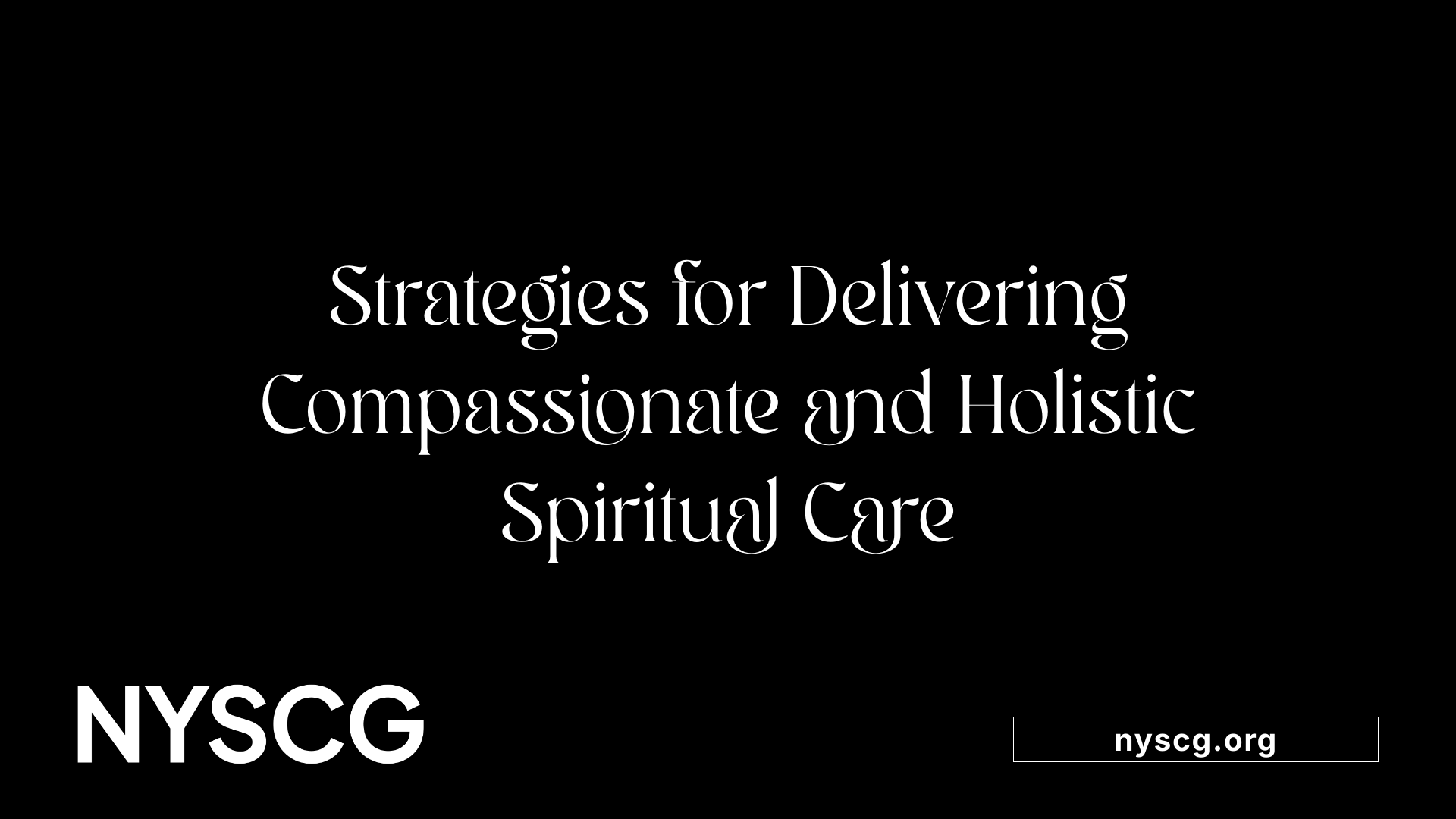
Delivering spiritual care in end-of-life settings requires a compassionate, tailored approach that respects each patient’s unique beliefs and needs. The first step is conducting comprehensive spiritual assessments using validated tools such as FICA (Faith, Importance, Community, Address) or HOPE (Hope, Organized religion, Personal spirituality, Effects on medical care). These assessments help identify individual spiritual concerns and preferences.
Active, empathetic listening plays a crucial role. Healthcare providers should pay attention to verbal cues and non-verbal signals, showing genuine presence and kindness. This can involve simple gestures like maintaining eye contact, offering a comforting touch, or simply being present with the patient during difficult conversations.
Supporting patients’ spiritual practices—such as prayer, meditation, or scripture reading—when they wish to engage in them is vital. Providers should avoid judgment or attempts at conversion, focusing instead on facilitating the patient’s spiritual exploration. When appropriate, involving trained spiritual caregivers or chaplains can enrich care by addressing complex spiritual or existential issues.
Collaboration with dedicated spiritual care professionals ensures that interventions are culturally sensitive and aligned with the patient's faith tradition. Integrating spiritual care into the overall care plan helps meet emotional, existential, and spiritual needs, fostering dignity, hope, and acceptance.
Finally, fostering connections with the patient’s faith community or spiritual support system can provide additional comfort. Respecting individual choices and ensuring open, honest communication about spiritual concerns supports holistic end-of-life care. This approach not only alleviates suffering but also promotes a sense of peace and meaning in patients’ final days.
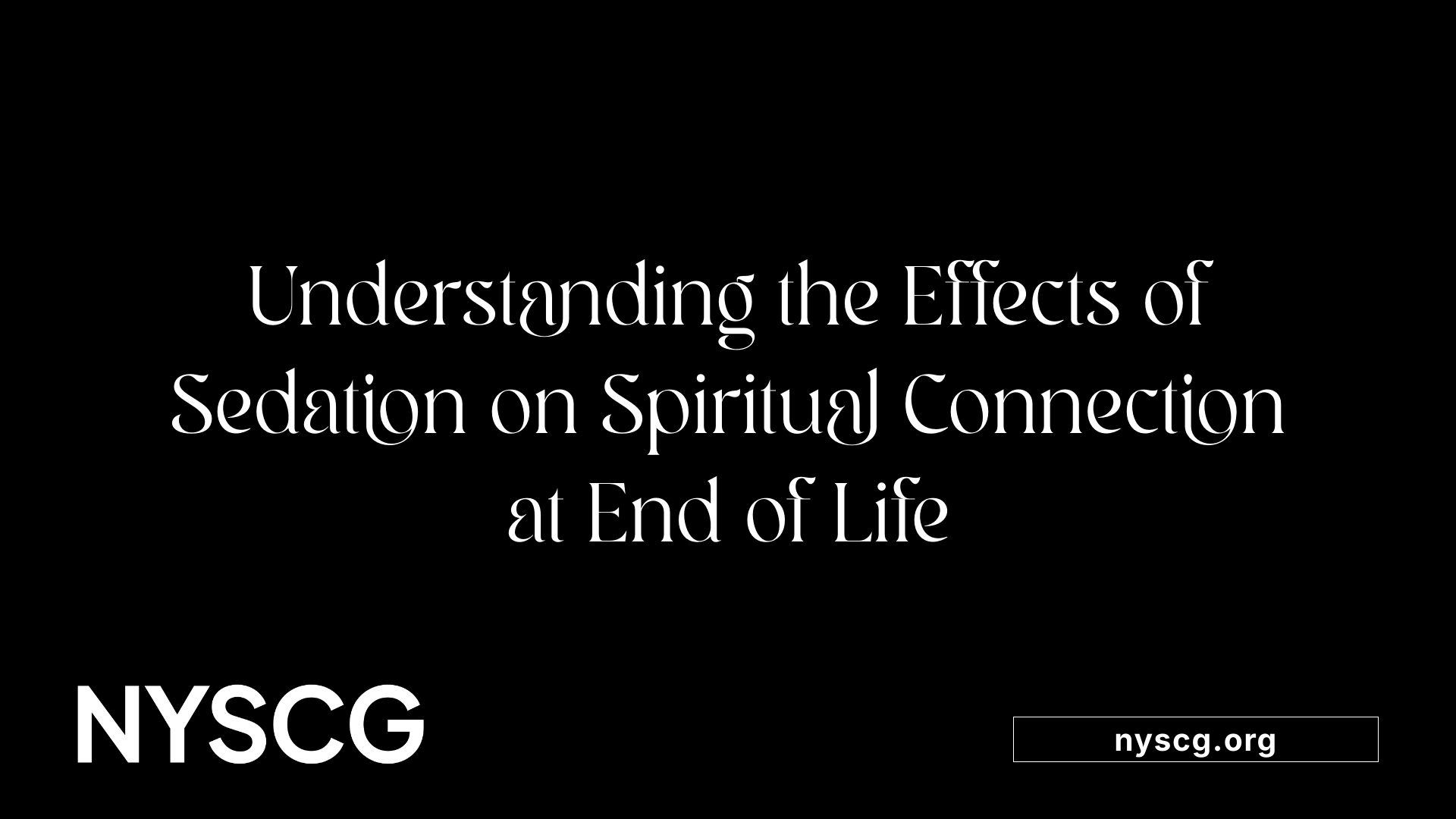
Sedation at the end of life is often necessary to manage severe and refractory symptoms, but it can influence patients' ability to engage in spiritual practices such as prayer, meditation, or reflection. Sedatives affect the level of consciousness, which in turn can limit awareness of the environment, other people, and one's own spiritual or divine presence.
For many patients, being conscious and alert is essential for experiencing spiritual connection, whether through prayer or feeling the Divine. When sedation reduces consciousness, it might prevent patients from fully participating in these spiritual experiences. This can be particularly significant for individuals whose faith emphasizes awareness and active engagement during the dying process.
However, there is evidence that sedation does not entirely eliminate the possibility of spiritual experiences. Some patients under sedation or in states of unconsciousness have reported mystical or spiritual encounters, such as sensing a divine presence or having out-of-body experiences. These accounts suggest that spiritual or mystical phenomena might occur independently of full consciousness.
Moreover, the role of sedation isn't limited to suppressing experiences; it can also serve to alleviate suffering, allowing patients to find peace and acceptance before death. In some cases, sedation might facilitate spiritual reflection by reducing pain and distress, creating a state where inner peace and spiritual growth can occur.
Ultimately, the relationship between sedation and spiritual experience is complex and highly individual. Healthcare providers should consider each patient's spiritual needs and beliefs when planning sedation and palliative care, recognizing that spiritual growth and encounters may still be possible even in reduced states of consciousness.
Spiritual well-being is a fundamental aspect of how patients navigate their illness and confront end-of-life issues. When patients feel spiritually supported, they tend to experience less confusion and uncertainty in their decision-making processes. This sense of clarity allows for choices that better reflect their personal values, beliefs, and life goals.
Research indicates that higher levels of spiritual well-being are closely linked to improved health outcomes, including better physical comfort, emotional resilience, and overall functioning. Such patients often report greater satisfaction with their care decisions, feeling more empowered and at peace.
Supportive spiritual care can strengthen patients' sense of purpose and reinforce their support networks, including family and community ties. This foundation helps individuals cope with complex emotions like fear and despair, transforming these feelings into sources of strength.
By fostering an environment where spiritual concerns are openly addressed, healthcare providers enable patients to make more informed, values-based choices. These decisions may include preferences on treatments, use of palliative sedation, or spiritual and religious rites at the end of life.
Overall, nurturing spiritual well-being enhances resilience, supports psychological health, and leads to a more compassionate and patient-centered approach in palliative care settings.
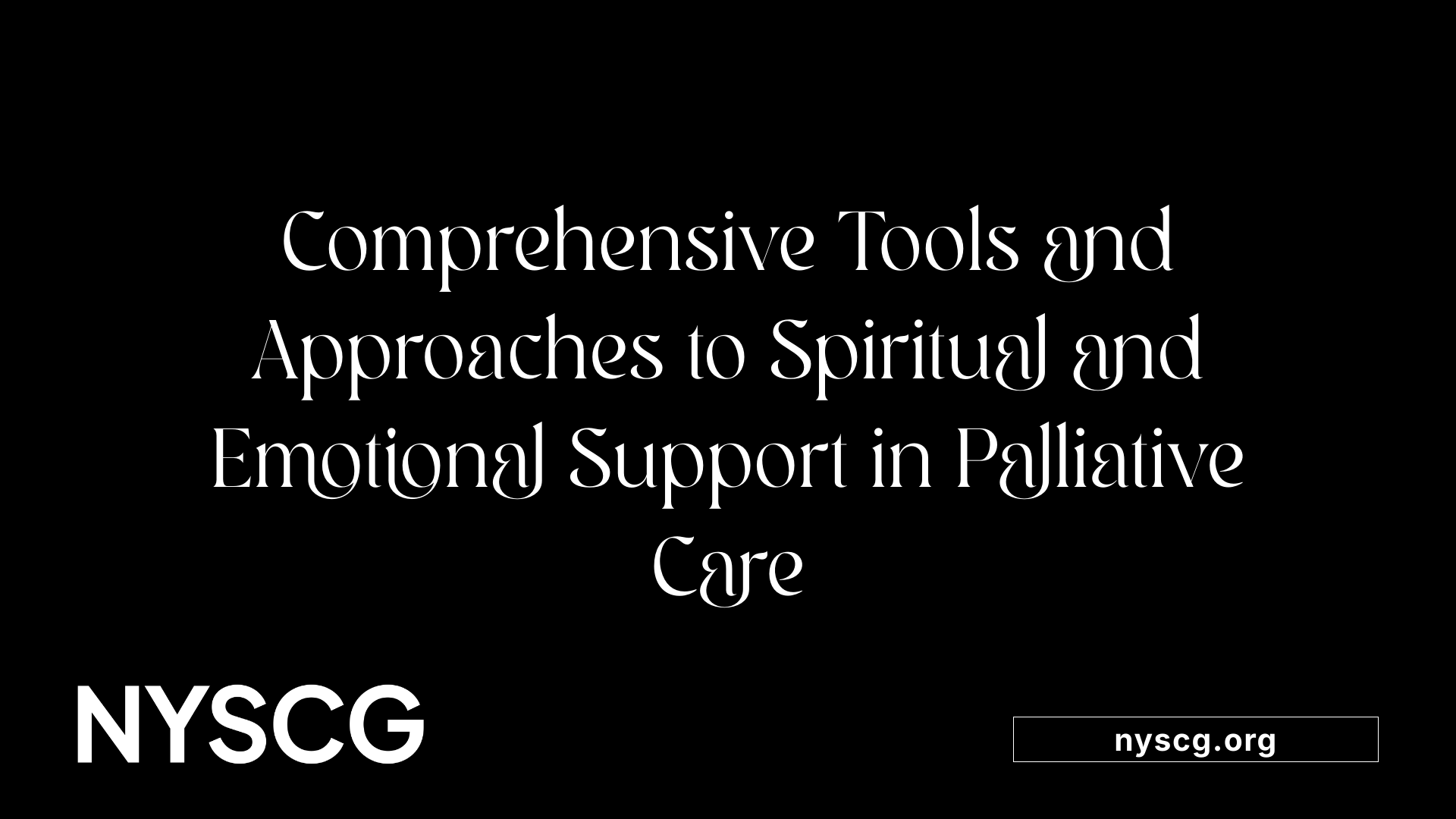
In palliative care, understanding and tending to the spiritual and emotional dimensions of patients are as vital as managing physical symptoms. Utilizing tools such as FICA, HOPE, and SPIRIT facilitates comprehensive spiritual assessments, helping healthcare providers uncover patients' beliefs, values, and existential concerns.
These assessments enable clinicians to identify issues like anxiety, depression, spiritual distress, or a sense of loss. Addressing these can alleviate suffering and improve overall quality of life during a serious illness. For instance, recognizing a patient's spiritual needs can lead to tailored interventions, such as facilitating meaningful rituals, supporting spiritual practices, or fostering reconciliation.
Psychosocial care complements spiritual assessment by addressing emotional and psychological challenges. It helps patients navigate fears about death, cope with changes in identity, or manage grief. During the COVID-19 pandemic, patients facing complex psychological and spiritual struggles benefitted from holistic care that incorporated mental health and spiritual support.
Providing targeted interventions—such as counseling, spiritual counseling, or connecting patients with chaplains—can foster resilience. It promotes emotional stability and spiritual peace, helping patients find meaning, acceptance, or reconciliation in their final days.
Overall, integrating spiritual and psychosocial care in palliative settings enhances patient-centered care. It supports emotional resilience, reduces feelings of isolation, and reinforces dignity and hope, ultimately leading to better health outcomes and a more compassionate approach during life’s most challenging transitions.
Tool NameFocus AreaDescriptionExample QuestionsFICAFaith, Importance, Community, AddressAssesses spiritual beliefs, importance, community support, and how to address spiritual needs"Do you have spiritual beliefs that help you cope?"HOPEHope, Organized religion, Personal spirituality, EffectsEvaluates hope levels, religious activities, personal spirituality, and impact on care"What are you hoping for during this time?"SPIRITSupport, Personal meaning, Rituals, Integrity, Relationships, TrustExplores support systems, personal meaning, rituals, spiritual integrity, relationships, and trust"Are there spiritual or religious practices meaningful to you?"
Healthcare providers should actively listen and be alert to cues indicating spiritual distress or emotional suffering. Signs include expressions of anger towards a higher power, hopelessness, feelings of meaninglessness, or questions about the purpose of suffering.
Addressing these issues involves creating a safe space for open dialogue, respecting individual beliefs, and facilitating appropriate spiritual or psychological support. Recognizing and intervening early can prevent despair and promote acceptance and peace.
Interventions should be tailored to individual needs, respecting cultural, religious, and personal preferences. Activities may include spiritual counseling, providing opportunities for prayer or meditation, facilitating rituals, or organizing farewell ceremonies.
Multidisciplinary teams, including chaplains, psychologists, and social workers, collaborate to deliver holistic support. Continuous evaluation ensures that spiritual and emotional needs are met, fostering dignity, hope, and comfort until the end of life.
Spiritual care in palliative settings faces several challenges that hinder its effective delivery. Common barriers include healthcare providers’ discomfort discussing spiritual issues, a lack of appropriate training to assess and address spiritual needs, concerns about limited time during consultations, worries over patient privacy, and cultural differences that may lead to misunderstandings or reluctance.
These obstacles often result in spiritual needs being overlooked, despite evidence showing that patients value and desire spiritual support in their end-of-life journey. Addressing these barriers requires strategic interventions.
Facilitators that enhance the integration of spiritual care involve fostering a strong team approach through multidisciplinary teamwork and developing trusting relationships with patients. Good communication is essential to identify and respond to spiritual concerns.
To improve the situation, healthcare systems should prioritize training programs that equip clinicians with skills in spiritual assessment and intervention. Promoting a culture of openness about spiritual issues encourages clinicians and patients to engage in meaningful conversations.
Structural funding plays a crucial role, ensuring that spiritual care services are available and sustainably integrated within healthcare settings. Recent advances, including increased funding and the organization of multidisciplinary meetings, are promising developments that aim to embed spiritual care into routine palliative practices.
Implementing standardized spiritual assessment tools and embedding spiritual care protocols within clinical pathways can help overcome hesitations and logistical barriers. These efforts aim to make spiritual care a norm rather than an exception, ultimately enriching holistic palliative care and improving patient well-being.
Research highlights a significant and increasing interest in the role of spiritual care within palliative and end-of-life care. A comprehensive bibliometric analysis examined 842 scholarly articles, revealing that the volume of publications has grown steadily since 1981, with a notable surge between 2019 and 2021. This trend illustrates an escalating recognition of spirituality as a fundamental aspect of holistic patient care.
Most research articles focus on themes like palliative care, spirituality, religious influences, and end-of-life experiences, emphasizing the importance of addressing these facets in clinical settings. The prominent journals contributing to this body of knowledge include the Journal of Pain and Symptom Management, which published the highest number of articles, and the Journal of Palliative Medicine, known for its influential citations.
Collaboration in research is primarily observed among authors from the UK, the US, and Australia, reflecting a global effort to integrate spiritual care into standard palliative practices. The COVID-19 pandemic further amplified the focus on spiritual health, with increased publications during this period demonstrating a heightened awareness of spiritual needs during crises.
Consistent findings from studies suggest that spiritual care interventions enhance patients’ quality of life, resilience, and overall well-being. They contribute to better psychological adjustment, increased sense of meaning, and improved coping mechanisms during terminal illness. These evidence-based insights reinforce the necessity of incorporating spiritual support as a core element of comprehensive palliative treatment, ultimately leading to more dignified and compassionate care at life’s end.
Ethical considerations in palliative sedation revolve around balancing the alleviation of suffering with respect for the patient’s moral, spiritual, and personal values. One of the primary concerns is ensuring that sedation does not excessively diminish the patient’s ability to interact, communicate, or engage in spiritual practices unless such reduction is deemed necessary to control refractory symptoms.
Professional guidelines recommend that palliative sedation be used only after thorough assessment by an interdisciplinary team, confirming that symptoms are truly refractory and that sedation aligns with the patient’s wishes and best interests. It is crucial to respect patient autonomy, which includes honoring their spiritual beliefs and existential concerns.
Spiritual care plays an influential role by providing insights into what the patient considers meaningful. It helps healthcare providers understand the patient’s spiritual and moral preferences, guiding decision-making processes towards ethically sound and compassionate choices.
The use of sedation aims to relieve severe suffering while preserving the dignity and moral integrity of the patient. Ongoing evaluation during sedation ensures that its application remains appropriate and ethically justifiable, preventing misuse or overreach.
Guidelines emphasize that sedation should be proportional to the severity of symptoms and not regarded as an irreversible measure. When used thoughtfully, it supports patient-centered care, respecting both biological and spiritual needs.
In sum, integrating spiritual care within the framework of ethical principles fosters a holistic approach to end-of-life care, ensuring that the patient’s beliefs, wishes, and moral values are central to sedation decisions. This comprehensive perspective helps maintain moral agency and dignity during the final stages of life.
For further reading, searching for "Ethical issues in palliative sedation" through trusted medical ethics resources will provide expanded perspectives and case studies that exemplify these principles.
The future of spiritual care in palliative practice appears promising and is expected to grow in importance. As awareness increases around the holistic needs of patients facing terminal illness, more emphasis will be placed on integrating spiritual support into standard care protocols.
Innovations in this field are anticipated to include personalized spiritual interventions that respect individual beliefs, cultural backgrounds, and preferences. Technology will play a significant role, enabling healthcare providers to perform remote spiritual assessments, offer virtual support, and facilitate ongoing spiritual engagement even when physical contact is limited.
Furthermore, advancements in training healthcare professionals will help bridge existing gaps, making spiritual care more accessible and competent across diverse care settings. This includes implementing structured educational programs, competency frameworks, and ongoing professional development focused on spiritual issues.
The role of multidisciplinary teams will become more prominent. Collaboration among doctors, nurses, chaplains, psychologists, and social workers will be crucial in delivering cohesive spiritual care that complements physical and psychological support.
Research is likely to expand, with studies aiming to quantify the benefits of spiritual interventions, deepen understanding of spiritual resilience, and identify best practices. Overall, enhanced commitment to spiritual care will foster a more compassionate and comprehensive approach, ensuring that patients at the end of life experience dignity, meaning, and peace.
Addressing spiritual needs is essential for a truly holistic approach to palliative sedation, enriching the end-of-life journey by providing meaning, comfort, and connection. Recognizing the profound influence of spiritual and cultural diversity, incorporating effective assessment tools, and fostering interdisciplinary collaboration can mitigate barriers and elevate the quality of care. As research continues to demonstrate the benefits of spiritual support—including improved coping, decision-making, and overall well-being—healthcare professionals are encouraged to prioritize spiritual care as a core component of palliative treatment. Looking ahead, innovations and increased training promise to embed spiritual care deeper into clinical practice, ensuring that every patient’s spiritual needs are acknowledged and respected, thereby fostering dignity and peace at life’s final chapter.
All you need is the will to make the world a better place.
New York State chaplain group inc. is a tax deductible organization with a federal tax Id number 92-383-4921